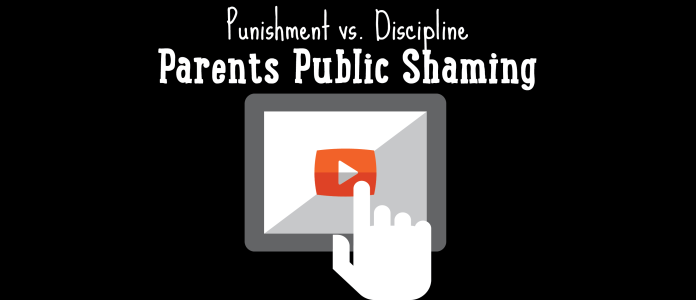You may have noticed recently that public shaming videos have been creeping up on online forums with increased frequency. Parents often create these videos in reaction to their child doing something they disapprove of, in an attempt to teach them a lesson. At first glance, these videos might seem like a harmless, creative way to punish behaviour, using technology where most children place a lot of value—their social media presence.
However, while seemingly light-hearted, there is a darker side to this form of public shaming.

The issue of parental public shaming became heated recently, when a thirteen-year-old girl died by suicide after her father posted a shaming video online. In this video, he questions his daughter about why he just cut all of her hair off, and whether her actions were worth the consequences. This is not the only example of public shaming, as many parents have taken to the Internet to try to teach their children a lesson.
Shaming as a form behavioural punishment for children has been around for thousands of years. But in an increasingly online world, social networks such as Youtube and Facebook have given parents new venues in which to shame their kids’ bad behaviour. These venues are inevitably more visible and amplified, and the effects are thus more harmful and permanent.
So why do parents do it?
Parents turn to public shaming as a form of last resort.When all other attempts to discipline or change the behaviour of their children have been unsuccessful, they turn to the child’s online social world as a form of “hitting them where it hurts”. Since teenagers are so tied to their online social networks, parents may believe that publically embarrassing their child through those networks will put an end to the undesirable behaviour.
The Effects of Online Shaming
It’s important to differentiate between discipline and punishment. Discipline teaches a child how they should act, and should be a response that makes sense to the child and give them a chance to correct their mistakes. Punishment does not teach a child what they should do; it simply teaches them that they are bad.
When a child is punished or shamed by their parent, it can inadvertently attack the child’s personality and not the behaviour the parent is attempting to reprimand. Instead of making the child understand that what they’ve done is wrong, shaming can actually make them feel like there’s something wrong with who they are.
In fact, shame is the worst consequence of emotional abuse, especially when it comes from a parent.
From a neurodevelopmental perspective, social brain structures are critical to a teenager’s development, which is why many teenagers are more sensitive to social evaluation from their peers. This makes it even more painful when parents use such a magnified social context to punish their children. Damage done during this stage of development, when social interactions are a priority for success in the future, can create long-lasting harm and emotional damage.
Why Shaming Doesn’t Work
While parents often have good intentions when punishing their child for bad behaviour, research supports that punishment is not an effective method, especially for teenagers. In fact, punishment during teenage years often has the opposite effect.
The teenage brain undergoes an immense amount of change during this time, in an attempt to “prune” its neurons to create more efficient pathways and connections in the frontal lobes. Brain structures in the frontal lobes are associated with executive functions—planning, organization, emotional regulation, etc. Not only do developmental changes in communication with these structures help explain many of the seemingly irrational and impulsive behaviours demonstrated by teenagers, but they can also create a sort of handicap in terms of rational decision-making.
The teenage brain is therefore in a highly vulnerable state. Instead of punishment and shaming, teenagers require additional guidance and social support.
Not only does shaming not work, it can make the problem worse. Our experience as child psychologists has taught us that bad behaviour in teenagers can sometimes stem from deeper psychological issues. For example, Oppositional Defiant Disorder (ODD), substance abuse, or underlying depression can manifest behaviourally in different ways such as through aggression, agitation, and behavioural conduct issues.
Public shaming could therefore fuel the underlying psychological problems the child may already suffering from, and push them into even worse behaviour.
What Parents Can Do Instead
Not only are teenage years a time when huge neurodevelopmental changes are impacting their executive functions, this is a time when teenagers are trying to establish their own identities and independence from their parents. Because of the nature of this relationship, many parents can withdraw from parenting at this time, or feel that they need to push back harder by being punitive and using punishment as a behavioural technique.
As mentioned above, shaming can amplify the problem and have life-long effects on the child by making them feel defective.
Instead, parents should provide:
- Support by listening without judgment
- Guidance to make the right decisions
- Information about teenage development
- Reassurance that you are on their side
Most importantly—be patient with your child during such a confusing time of change.
Your child’s teenage years are a difficult time for both you and your child. It’s important to remember that no matter how independent your child appears, or how troubled their behaviour has become, all children need to feel loved and accepted. Try to help your child through positive interactions and constant support, and avoid “humiliation parenting” techniques to attempt to change behaviour. Not only can public shaming aggravate the situation, but it will destroy the trust alliance between you and your child.
